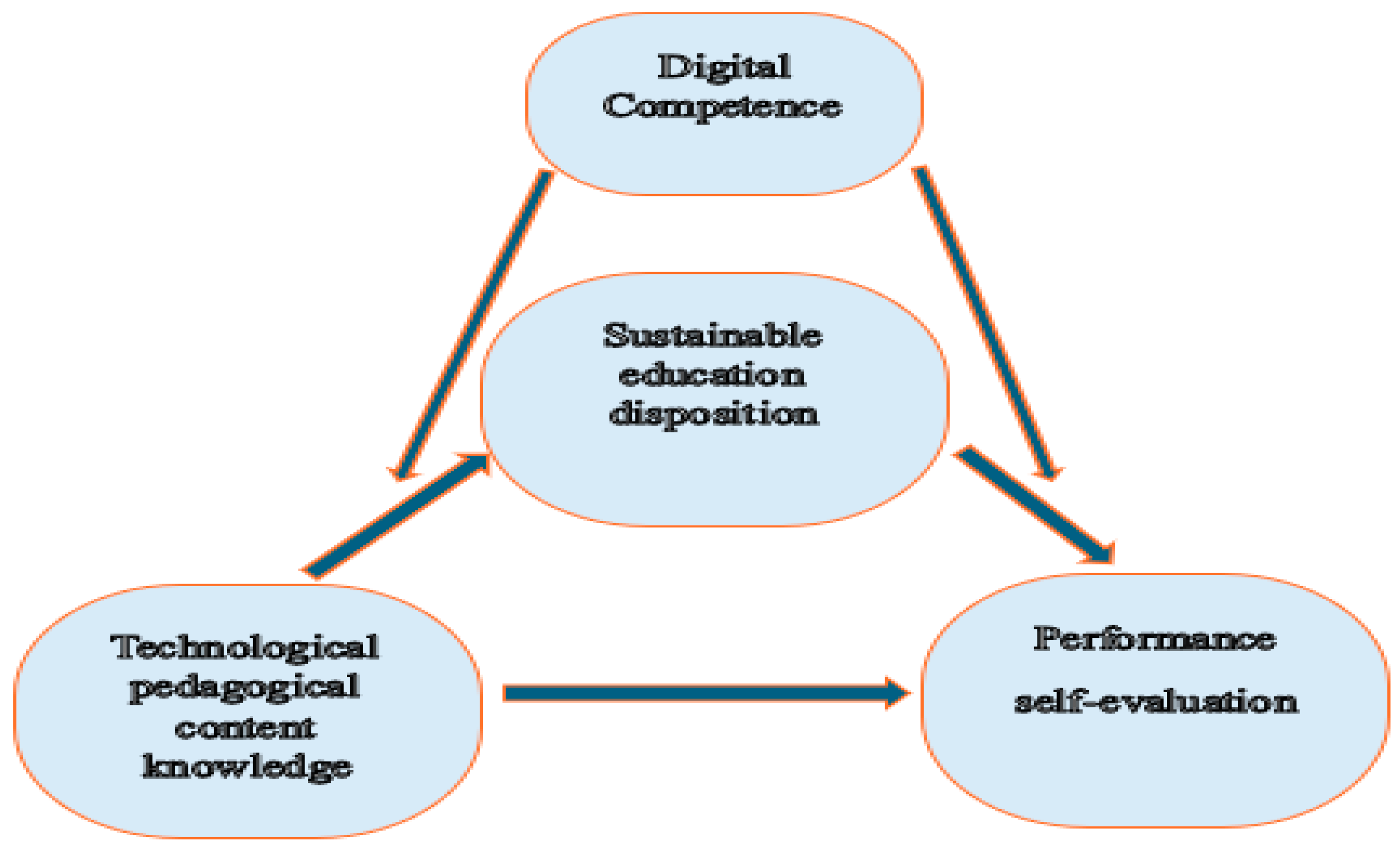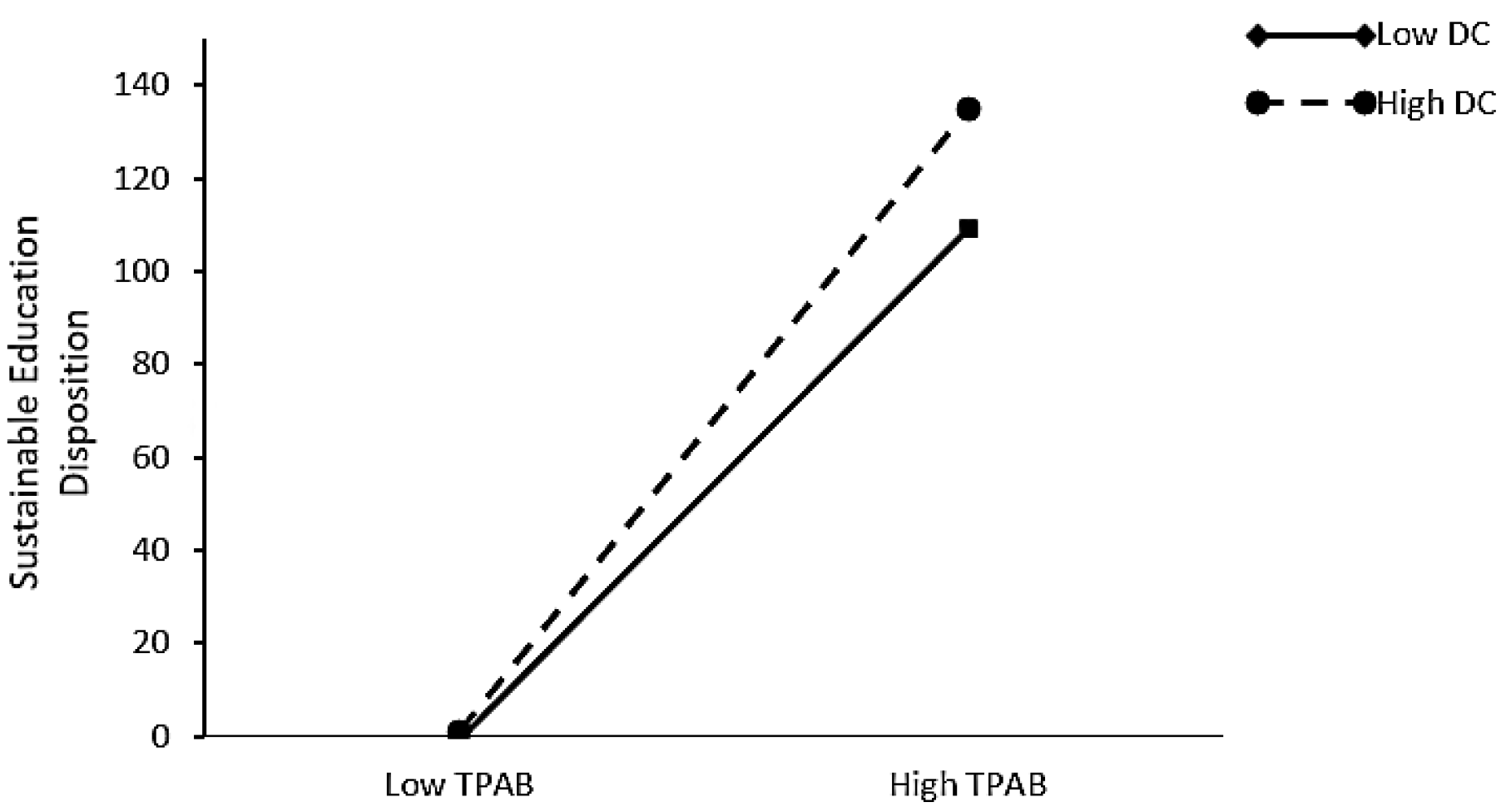The Role of Sustainable Education and Digital Competence in the Relationship Between Teachers’ TPACK Levels and Performance Self-Assessments
Abstract
1. Introduction
2. Literature Review
2.1. Technological Pedagogical Content Knowledge (TPACK) and Teacher Performance
2.2. Sustainable Education Disposition
2.3. Digital Competence
2.4. The Current Study
3. Materials and Methods
3.1. Research Sample
3.2. Data Collection Tools
3.3. Data Analysis
4. Results
5. Discussion
6. Conclusions
7. Limitations and Future Studies
Author Contributions
Funding
Institutional Review Board Statement
Informed Consent Statement
Data Availability Statement
Conflicts of Interest
References
- Mishra, P.; Koehler, M.J. Technological Pedagogical Content Knowledge: A Framework for Integrating Technology in Teacher Knowledge. Teach. Coll. Rec. 2006, 108, 1017–1054. [Google Scholar]
- Koehler, M.J.; Mishra, P. What Is Technological Pedagogical Content Knowledge (TPACK)? Contemp. Issues Technol. Teach. Educ. 2009, 9, 60–70. [Google Scholar]
- Schmid, M.; Brianza, E.; Petko, D. Self-Reported Technological Pedagogical Content Knowledge (TPACK) of Pre-Service Teachers in Relation to Digital Technology Use in Lesson Plans. Comput. Hum. Behav. 2021, 115, 106586. [Google Scholar] [CrossRef]
- Joo, Y.J.; Park, S.; Lim, E. Factors Influencing Preservice Teachers’ Intention to Use Technology: TPACK, Teacher Self-Efficacy, and Technology Acceptance Model. J. Educ. Technol. Soc. 2018, 21, 48–59. [Google Scholar]
- Keser, H.; Karaoğlan-Yılmaz, F.G.; Yılmaz, R. TPACK Competencies and Technology Integration Self-Efficacy Perceptions of Pre-Service Teachers. Elem. Educ. Online 2015, 14, 1193–1207. [Google Scholar]
- Valtonen, T.; Sointu, E.; Kukkonen, J.; Kontkanen, S.; Lambert, M.C.; Mäkitalo-Siegl, K. TPACK Updated to Measure Pre-Service Teachers’ Twenty-First Century Skills. Australas. J. Educ. Technol. 2017, 33, 15–31. [Google Scholar] [CrossRef]
- Darling-Hammond, L. Creating a Comprehensive System for Evaluating and Supporting Effective Teaching; Stanford Center for Opportunity Policy in Education: Stanford, CA, USA, 2012. [Google Scholar]
- Tilbury, D. Education for Sustainable Development: An Expert Review of Processes and Learning; UNESCO: Paris, France, 2011. [Google Scholar]
- Barth, M.; Michelsen, G.; Rieckmann, M.; Thomas, I. Routledge Handbook of Higher Education for Sustainable Development; Routledge: Abingdon-on-Thames, UK, 2015. [Google Scholar]
- Barth, M.; Godemann, J.; Rieckmann, M.; Stoltenberg, U. Developing Key Competencies for Sustainable Development in Higher Education. Int. J. Sustain. High. Educ. 2007, 8, 416–430. [Google Scholar] [CrossRef]
- European Commission. DigCompEdu: The Digital Competence Framework for Educators; Publications Office of the European Union: Luxembourg, 2018; Available online: https://joint-research-centre.ec.europa.eu/digcompedu_en (accessed on 25 March 2025).
- Masias-Fernandez, M.; Acosta, T.; Rivera, J.; Ayambo-Cortez, W.; Chiparra, W. Digital Competence and Job Performance in University Teachers in the Public Sector. Int. J. Prof. Bus. Rev. 2023, 8, e03251. [Google Scholar] [CrossRef]
- Subekti, M.; Suryadi, S.; Ahmad, M. Transforming Teacher Performance: The Impact of Training and Professional Development on Competence Improvement. Proceeding Int. Conf. Islam. Educ. (ICIED) 2024, 9, 218–229. [Google Scholar] [CrossRef]
- Shulman, L.S. Those Who Understand: Knowledge Growth in Teaching. Educ. Res. 1986, 15, 4–14. [Google Scholar] [CrossRef]
- Koehler, M.J.; Mishra, P.; Cain, W. What Is Technological Pedagogical Content Knowledge (TPACK)? In Handbook of Research on Educational Communications and Technology; Spector, J.M., Merrill, M.D., Elen, J., Bishop, M.J., Eds.; Springer: Berlin/Heidelberg, Germany, 2013; pp. 101–111. [Google Scholar] [CrossRef]
- Chai, C.S.; Koh, J.H.L.; Tsai, C.C. A Review of Technological Pedagogical Content Knowledge. Educ. Technol. Soc. 2013, 16, 31–51. [Google Scholar]
- Voogt, J.; Fisser, P.; Pareja Roblin, N.; Tondeur, J.; van Braak, J. Technological Pedagogical Content Knowledge—A Review of the Literature. J. Comput. Assist. Learn. 2012, 29, 109–121. [Google Scholar] [CrossRef]
- Harris, J.; Mishra, P.; Koehler, M.J. Teachers’ Technological Pedagogical Content Knowledge and Learning Activity Types: Curriculum-Based Technology Integration Reframed. J. Res. Technol. Educ. 2009, 41, 393–416. [Google Scholar] [CrossRef]
- Niess, M.L. Investigating TPACK: Knowledge Growth in Teaching with Technology. J. Educ. Comput. Res. 2011, 44, 299–317. [Google Scholar] [CrossRef]
- Tondeur, J.; van Braak, J.; Sang, G.; Voogt, J.; Fisser, P.; Ottenbreit-Leftwich, A. Preparing Pre-Service Teachers to Integrate Technology in Education: A Synthesis of Qualitative Evidence. Comput. Educ. 2012, 59, 134–144. [Google Scholar]
- Chai, C.S.; Hwee Ling Koh, J.; Teo, Y.H. Enhancing and Modeling Teachers’ Design Beliefs and Efficacy of Technological Pedagogical Content Knowledge for 21st Century Quality Learning. J. Educ. Comput. Res. 2018, 57, 360–384. [Google Scholar] [CrossRef]
- Tiryaki, S.H.; Hali, S. Teachers’ Self-Efficacy of Technological Pedagogical Content Knowledge and Using Education Informatics Network. J. Uludag Univ. Fac. Educ. 2022, 35, 577–600. [Google Scholar]
- Şahin, I.; Çelik, I.; Aktürk, A.O.; Aydın, M. Analysis of Relationships between Technological Pedagogical Content Knowledge and Educational Internet Use. J. Digit. Learn. Teach. Educ. 2013, 29, 110–117. [Google Scholar]
- Lee, M.H.; Tsai, C.C. Exploring Teachers’ Perceived Self Efficacy and Technological Pedagogical Content Knowledge with Respect to Educational Use of the World Wide Web. Instr. Sci. Int. J. Learn. Sci. 2010, 38, 1–21. [Google Scholar]
- OECD. The Future of Education and Skills. Education 2030/2040; OECD: Paris, France, 2018; Available online: https://www.oecd.org/en/about/projects/future-of-education-and-skills-2030.html (accessed on 25 March 2025).
- Scherer, R.; Siddiq, F.; Teo, T. Becoming More Specific: Measuring and Modeling Teachers’ Perceived Usefulness of ICT in the Context of Teaching and Learning. Comput. Educ. 2015, 88, 202–214. [Google Scholar] [CrossRef]
- UNESCO. Education for Sustainable Development Goals: Learning Objectives; United Nations Educational, Scientific and Cultural Organization: Paris, France, 2017; Available online: https://unesdoc.unesco.org/ark:/48223/pf0000247444 (accessed on 30 March 2025).
- Sterling, S. Sustainable Education: Re-Visioning Learning and Change; Green Books: Prague, Czech Republic, 2001. [Google Scholar]
- Köybaşı Şemin, F. Developing Sustainable Education Disposition Scale and Teacher Views regarding the Education Disposition. J. Educ. Future 2020, 17, 65–81. [Google Scholar] [CrossRef]
- OECD. Students’ Well-Being Report; OECD: Paris, France, 2015; Available online: https://www.oecd.org/education/pisa-2015-results-volume-iii-9789264273856-en.htm (accessed on 25 March 2025).
- Olsson, D.; Gericke, N.; Chang Rundgren, S.N. The Effect of Implementation of Education for Sustainable Development in Swedish Compulsory Schools–Assessing Pupils’ Sustainability Consciousness. Environ. Educ. Res. 2015, 22, 176–202. [Google Scholar] [CrossRef]
- Sleurs, W. (Ed.) Competencies for ESD (Education for Sustainable Development) Teachers: A Framework to Integrate ESD in the Curriculum of Teacher Training Institutes; UNECE: Geneva, Switzerland, 2008; Available online: https://ue4sd.glos.ac.uk/downloads/CSCT_Handbook_11_01_08.pdf (accessed on 30 March 2025).
- Lozano, R.; Merrill, M.Y.; Sammalisto, K.; Ceulemans, K.; Lozano, F.J. Connecting Competences and Pedagogical Approaches for Sustainable Development in Higher Education: A Literature Review and Framework Proposal. Sustainability 2017, 9, 1889. [Google Scholar] [CrossRef]
- Redecker, C. European Framework for the Digital Competence of Educators: DigCompEdu; Publications Office of the European Union: Luxembourg, 2017. [Google Scholar] [CrossRef]
- Hatlevik, O.E. Examining the Relationship between Teachers’ Self-Efficacy, their Digital Competence, Strategies to Evaluate Information, and Use of ICT at School. Scand. J. Educ. Res. 2017, 61, 555–567. [Google Scholar] [CrossRef]
- Krumsvik, R.J.; Øen Jones, L.; Øfstedgaard, M.; Eikeland, O.J. Upper Secondary School Teachers’ Digital Competence: Analysed by Demographic, Personal and Professional Characteristics. Nord. J. Digit. Lit. 2016, 11, 143–164. [Google Scholar] [CrossRef]
- Tzafilkou, K.; Perifanou, M.; Economides, A.A. Assessing Teachers’ Digital Competence in Primary and Secondary Education: Applying a New Instrument to Integrate Pedagogical and Professional Elements for Digital Education. Educ. Inf. Technol. 2023, 28, 16017–16040. [Google Scholar] [CrossRef]
- OECD. Trends Shaping Education 2019; OECD Publishing: Paris, France, 2019. [Google Scholar] [CrossRef]
- Quan, J.; Baharom, S. The Effect of Teachers’ Digital Competencis on Students’ Academic Achievements: A Systematic Review. J. Inf. Syst. Eng. Manag. 2025, 10, 446–461. [Google Scholar]
- Yılmaz Ergül, D.; Taşar, M.F. Development and Validation of the Teachers’ Digital Competence Scale. J. Learn. Teach. Digit. Age 2023, 8, 148–160. [Google Scholar]
- Yıldırım, R.; Yılmaz, E. Development of Teacher Performance SelfEvaluation Scale: Validity and Reliability Study. J. Nternational Ducation Sci. 2023, 10, 21–47. [Google Scholar]
- Alpaslan, M.M.; Ulubey, Ö.; Ata, R. Adaptation of Technological Pedagogical Content Knowledge Scale into Turkish Culture within the Scope of 21st Century Skills. Psycho-Educ. Res. Rev. 2021, 10, 77–91. [Google Scholar]
- MacKinnon, D.P.; Fairchild, A.J. Current Directions in Mediation Analysis. Curr. Dir. Psychol. Sci. 2009, 18, 16–20. [Google Scholar] [CrossRef] [PubMed]
- Hayes, A.F. Introduction to Mediation, Moderation, and Conditional Process Analysis: A Regression-Based Approach, 3rd ed.; The Guilford Press: New York, NY, USA, 2022. [Google Scholar]
- Baron, R.M.; Kenny, D.A. The Moderator–Mediator Variable Distinction in Social Psychological Research: Conceptual, Strategic, and Statistical Considerations. J. Personal. Soc. Psychol. 1986, 51, 1173–1182. [Google Scholar] [CrossRef]
- Kline, R.B. Principles and Practice of Structural Equation Modeling, 4th ed.; The Guilford Press: New York, NY, USA, 2016. [Google Scholar]
- Wang, Z.; Chu, Z. Examination of Higher Education Teachers’ Self-Perception of Digital Competence, Self-Efficacy, and Facilitating Conditions: An Empirical Study in the Context of China. Sustainability 2023, 15, 10945. [Google Scholar] [CrossRef]
- Alonso-García, S.; Gómez-Flechoso, M.Á.; Castrillón, M. Effectiveness of a Peer Mentoring on University Dropout and Academic Performance. Psicol. Educ. 2024, 30, 29–37. [Google Scholar] [CrossRef]






| N (%) | ||
|---|---|---|
| Gender | Female | 305 (63.8) |
| Male | 173 (36.2) | |
| Professional experience | 1–4 years | 260 (54.4) |
| 5–8 years | 65 (13.6) | |
| 9–12 years | 24 (5.0) | |
| 13–26 years | 35 (7.3) | |
| 17 years and more | 94 (19.7) | |
| Faculty | Faculty of Education | 336 (70.3) |
| Faculty of Science and literature | 99 (20.7) | |
| Others | 43 (9.0) | |
| Total | 478 (100.0) | |
| Mean (sd) | Skew. | Kurt. | 1 | 2 | 3 | 4 | |
|---|---|---|---|---|---|---|---|
| Technological Pedagogical Content Knowledge | 68.00 | −0.84 | 0.52 | 1 | 0.649 ** | 0.653 ** | 0.466 ** |
| Digital Competence | 70.93 | −0.44 | 0.13 | 1 | 0.719 ** | 0.515 ** | |
| Teachers’ Performance Self-Evaluation | 77.18 | 0.28 | 0.70 | 1 | 0.529 ** | ||
| Sustainable Education Disposition | 123.20 | −0.61 | 1.43 | 1 |
| R2 | F | β | SE | t | p | LLCI | ULCI | |
|---|---|---|---|---|---|---|---|---|
| Model 1 | 0.564 | 73.801 ** | ||||||
| TTPACK | −0.909 | 21.658 | 6.140 | 0.000 | 90.426 | 175.542 | ||
| DC | −0.612 | 0.331 | −1.847 | 0.065 | −1.262 | −0.243 | ||
| TTPACK × DC | 0.019 | 0.004 | 4.003 | 0.000 | 0.009 | 0.028 | ||
| Model 2 | 0.780 | 184.445 ** | ||||||
| TTPACK | 0.198 | 0.026 | 7.535 | 0.000 | 0.146 | 0.249 | ||
| SED | −0.125 | 0.050 | −2.514 | 0.012 | −0.224 | −0.027 | ||
| DC | −0.022 | 0.089 | −0.246 | 0.805 | −0.198 | 0.154 | ||
| SED × DC | 0.002 | 0.000 | 3.929 | 0.000 | 0.001 | 0.004 |
Disclaimer/Publisher’s Note: The statements, opinions and data contained in all publications are solely those of the individual author(s) and contributor(s) and not of MDPI and/or the editor(s). MDPI and/or the editor(s) disclaim responsibility for any injury to people or property resulting from any ideas, methods, instructions or products referred to in the content. |
© 2025 by the authors. Licensee MDPI, Basel, Switzerland. This article is an open access article distributed under the terms and conditions of the Creative Commons Attribution (CC BY) license (https://creativecommons.org/licenses/by/4.0/).
Share and Cite
Veyis, F.; Ciğerci, F.M. The Role of Sustainable Education and Digital Competence in the Relationship Between Teachers’ TPACK Levels and Performance Self-Assessments. Sustainability 2025, 17, 6585. https://doi.org/10.3390/su17146585
Veyis F, Ciğerci FM. The Role of Sustainable Education and Digital Competence in the Relationship Between Teachers’ TPACK Levels and Performance Self-Assessments. Sustainability. 2025; 17(14):6585. https://doi.org/10.3390/su17146585
Chicago/Turabian StyleVeyis, Fatih, and Fatih Mehmet Ciğerci. 2025. "The Role of Sustainable Education and Digital Competence in the Relationship Between Teachers’ TPACK Levels and Performance Self-Assessments" Sustainability 17, no. 14: 6585. https://doi.org/10.3390/su17146585
APA StyleVeyis, F., & Ciğerci, F. M. (2025). The Role of Sustainable Education and Digital Competence in the Relationship Between Teachers’ TPACK Levels and Performance Self-Assessments. Sustainability, 17(14), 6585. https://doi.org/10.3390/su17146585





